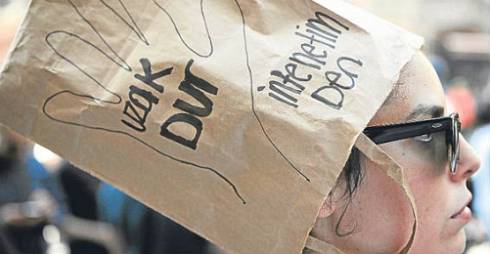
bianet interviewed Serhat Koç, a telecommunications lawyer and spokesman for the Turkey's Pirate Party, on the Draft Bill No 5651 on the internet services in Turkey.
“If the draft will be implemented, the life will harder for internet users in Turkey. Censors on citizen journalism, scientific research and social media will be a routine,” he said.
He also added that new institutions will allows authorities to implement Censors in skyrocket speed.
“Due to censorship, service providers will enhance their auto-censor mechanisms and alternative methods like DNS change will no longer work,” he added.
Bill increases the likelihood of censor
What is the aforementioned bill bringing new?
A revision proposal on Law 5651 has been added to current law proposal. The new version envisions more grave Censor practices. Even the current bill causes several issues regarding internet censorship and press freedom.
Instead of improving the bill, the new version tends to worsen the censor mechanisms.
On the other hand, the draft bill also includes revisions on hate speech. Is the draft really bad as it sounds?
The draft bill also put hate speech in the category for internet ban. This is the most problematic aspect of the bill, maybe. Because Turkish Penal Code interprets hate speech towards “Islam, Muslims, Turkish-ness, Sunni sect”. As a result, we observe cases like the ones of Fazıl Say and Sevan Nişanyan who have been convicted of charges related to freedom expression. Websites like “yenidonem.com” (newera.com) are closed down. Even though hate speech is important, I am pretty skeptical about how it will be interpreted on the internet. Some many website might be closed down because of that.
What else is in there?
The new draft compels judges to respond to internet-based “right violations complaints” in 24 hours. Considering that most of our judges have little idea about the internet, it is highly doubtful how they will make their decisions. We have faith on them! It is also up to İnternet Geliştirme Kurulu (Internet Improvement Institution) to decide on situations like monitoring, restriction, application or inspection.
It is something like National Security Agency in the U.S. It will also enable ministers and telecommunication authorities to be compatible on giving internet censor orders directly.
Changing DNS will not work
What is IP and URL? What are the consequences for regular users?
The old measures were envisioning restrictions for the “problematic” content. The new draft will envision bans on URLs which is entire website-based.
It will also accept IP-based censorship. Previously, some websites were out reach even though they were not banned. It is similar to that.
In addition that, changing DNS will not work in order to have access to the websites. Because access providers will be required to submit all information regarding anti-censor techniques to telecommunication authorities.
URL-based restriction/monitoring/saving towards the entire content is also something new with the draft. This will slow down the internet traffic for Turkey and cause breach confidentiality of personal data.
Paving the way for censor and auto-censor
How will the bill affect service providers like Google, Facebook and Twitter?
Inspecting all internet actors severely and censuring them will push internet actors to run their auto-censor mechanisms.
According to that, all providers will be required to take all sorts of “protective measures” even though there is no evident crime.
The draft envisions Erişim Sağlayıcılar Birliği (Access Providers Union). What is that?
According to the draft bill, access restriction decisions will be sent to the union and complaints to the union will be considered made to service providers. It will mandatory to join the union, as the draft bill envisions penalty for not joining. The union will have to take all censorship demands into effect in 4 hours.
What should be done? What do you recommend?
Instead of implementing decision on access restrictions, a new decision-making mechanism must be formed according to the internet democracy. Access restrictions based on IP and URL must not be accepted at all and restricting access must be the “last option”.
The bill must never allow judges to restrict access within 24 hours or push service providers to implement changes within 4 hours. These are ultra fast automatic censor mechanisms.
Just like the addendum on hate speech, the first draft must not include a enlarging of catalog crimes. These crimes must be reduced, all must be removed including obscenity.
In no democratic country, you can accept ministers and telecommunication authorities to be compatible on giving internet censor orders directly.
The draft also envision Erişim Sağlayıcılar Birliği (Access Providers Union) which is likely to turn into a center for censorship. This can’t be accepted.
In order to say “no” to censor, we are taking action on twitter under the hashtag #SansüreHayırDe (SayNoToCensor). In one of the latest discussions, people were planning mass protests like take the streets and cancel their internet subscriptions or not paying their bills. (EA/EKN/BM)





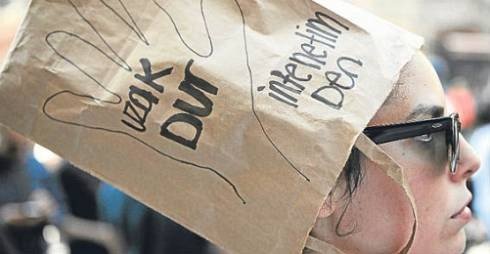
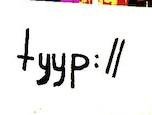


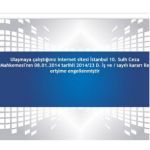
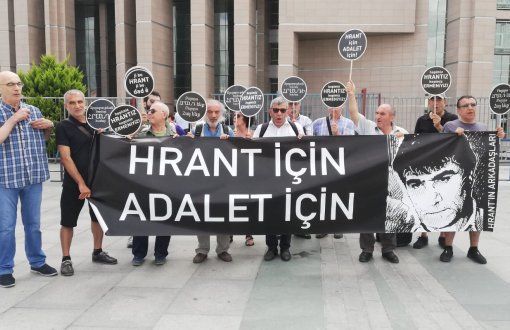


.jpg)
.jpg)